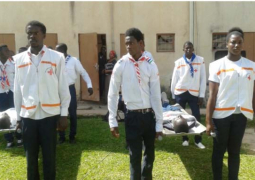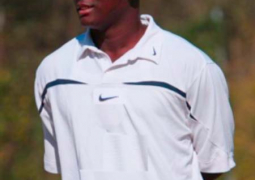The book launch ceremony was held recently at the National Museum premises in Banjul.
On the eve of the event, Cornelius Gomez gave the following interview to Hassoum Ceesay entitled, “The power of story-telling”.
Interview with Cornelius Gomez – Master Story-teller
One of The Gambia’s master story tellers and a linguist, Cornelius Gomez, talks about the role of the story telling genre and national languages in national development on the eve of the launch of his new titles at the National Museum in Banjul.
Interview by:Hassoum Ceesay
Who is Connie Gomez?
I was born in Banjul. I attended St. Augustines High School, taught in primary schools in all parts of The Gambia, and also I worked as a bus conductor at the former GPTC. I studied French and Wollof grammar at the prestigious Cheikh Anta Diop University in Dakar, where I graduated in 1985.Then I taught at St Josephs High School from 1985 to 1999, when I joined the NCAC as Director of Literature, Performing and Fine Arts till 2012 when I retired from government service. In retirement, I continue to write and broadcast on HOT FM in Bakau. I also act in films.
What motivated you into the genre of story-telling?
To safeguard a popular and vital aspect of our cultural heritage, being distorted and gradually forgotten; revive storytelling at home and in schools; to develop our cultural heritage from the oral to the written – an integral part of my studies in Dakar; and, to ensure easy transmission and entrench positive Black African values in folk tales.
What do you think is the role of story-telling in national development?
To educate both young and the elderly morally, spiritually and intellectually.Folk-tales and fables reflect all these values.If these viable elements can be inculcated into the minds of the young ones, who are very prone to foreign animation, then the youth of The Gambia would be proud of their culture and live a disciplined and successful life.The lessons learnt in our folk-tales and fables ensure positive attitudes in our society.There can be no meaningful development without moral integrity. Our folk-tales and fables are in high demand.Those who used to enjoy the narrations on GRTS and on the radio accost me anywhere and any-time, demanding a return of such a favourite programme.
However, their oral nature still threatens their existence.This is why I have decided to write them down.But I am not stopping at that.I must sensitize both public and private stakeholders by launching these books.In this way, I hope to draw their attention towards fruitful partnerships, promotion and development of our cultural goldmine for advocacy, cultural marketing and tourism.All my guests are literate and conscious of the sketches, cartoons, films and publicity based on our folk-tales and fables.
You are also a trained Olof linguist, a graduate of the respected Cheikh Anta Diop University in Senegal. What is the role of our national languages in national development?
Language is the main driving force of any culture and knowledge.A wide range of knowledge can be expressed, understood, and documented only through the use of one’s mother-tongue or native language. This can help avoid inadequacies between the original idea and the final expression.Imagine how constituents would feel if they heard their elected National Assembly Member address their concerns in Parliament, using the language they understand and vice versa.Some of our National Assembly members are held back from contributing to discussions during debates due to such inadequacies, which could breed lack of confidence and trust.A legislator must understand and be understood.
The Romans used to say “translator = traitor” (traditore = tradutore)
When you read documents written in Olof to an Olof-speaking society, you need no translation because they are understood completely.
Development of literature written in our national languages, will preserve their beauty and richness also.
Should national languages be the medium of instruction in schools?
Oh yes!To a certain extent.
The teaching of grammar and transcription of our national languages is very capital.In order to acquire knowledge of our traditions and customs, as well as our history, we need to be able to read and write in the language of the informant.
Moreover, such instruction in our schools can facilitate the learning of other national languages just like French, Spanish, Portuguest etc. This breeds greater national cohesion and integration.The pilot project in this area embarked upon by Ministry of Basic and Secondary Education (MoBSE) is very laudable.Charity begins at home.
What are the challenges?
For centuries, English has become an unchallengeable language for international communication, instruction and modern technology.Thus, it has become highly dominant over others.Furthermore, this has been compounded by the fact that the speaking and teaching of our national languages in our schools have been suppressed, for so long that 99% of our literate society cannot read or write their own languages, despite the fact that they can speak them fluently.Even in some private schools in The Gambia, the use of our national languages is still prohibited, whilst foreigners working in The Gambia learn and speak them!
This is only a difficult situation, but not an impossibility.The limited geographical area of our national languages is also a stumbling block.Yet, no matter how small we might be physically, we have a right to exist culturally.
How is the task of writing and publishing in The Gambia? Is it worthwhile?
Only if the subject is interesting and relevant to the hopes and aspirations of the literate environment.Though a lot of financial constraints and technical hurdles could be encountered by the majority of Gambian writers, it is still better to spend more time imagining and creating while waiting for possibilities, rather than waste too much time in the bar with fifteen men drinking rum and dancing on the dead man’s chest!
Tell me, who and who have been very supportive in your work?
My chief patron is undoubtedly His Excellency Sheikh Professor Alhagi Dr. Yahya AJJ Jammeh President of The Republic of The Gambia, who through his interest and generosity made it possible for me to produce all three books at the same time.There is also the Social Security and Housing Finance Corporation, Trust Bank Limited, GAMCEL, SKY Bank, the permanent secretary (MoBSE) and my former lecturer Professor Dr. Amadou Diallo (UCAD).Hassoum Ceesay, Nana Grey-Johnson and the NCAC have been consistently pushing me on also.
Tell us about the books you have authored so far?
So far, I have produced three books namely:
1. LET US READ AND WRITE OLOF BOOK 1
2. LÉEBOON!LUPÉEN!VOL.1
3. GAMBIAN FOLK TALES AND FABLES VOL.1
The first book which introduces the ABC of Olof colourfully illustrated is basically a facilitator for understanding how to read and write in Olof.This manual is accompanied with simple exercises of orthography and phonology.
The second book is a collection of fifteen carefully-selected Wolof folk-tales and fables written in Olof.They are original and colourfully illustrated.
The stories expose the beauty and richness of the language e.g. diction, proverbs, similar, metaphors, puzzles, idiomatic expressions, songs etc.There is also a lot of sarcasm, satire and humour which naturally characterizes Olof.
The third book is the English version of the second book.Like the second, each story is followed by a set of comprehensive exercises to test the reader’s understanding of the folk-tales and fables, and to derive the moral lesson behind them.There is also a glossary at the end of the book to explain certain local words.It is colourfully illustrated as well.
All three books have a pedagogical approach and an ethnological value.Most important, all three books have been reviewed, approved and recommended by the Ministry of Basic and Secondary Education (MOBSE) for use as supplementary materials in our schools.
Any final words?
Along the long and arduous road to intellectualism, we need to know who we are, where we come from and where we are heading.For the moral upbringing of our children, it is high time we perceive cultural awareness in a more dynamic and meaningful manner.
These books are fundamental aspects of our ROOTS.It is disheartening that parents of today hardly have time to narrate folk-tales and fables for their kids, both at home and abroad.These works therefore help to fill this vaccum.
Those who have the time should spend it in the night to narrate our folk-tales and fables to their children or provide them with these books.They should also encourage them to write down the stories they listen to and enjoy.In this way, we can transmit and preserve this invaluable cultural heritage.
Finally, I appeal for sponsorship to re-introduce this goldmine which belongs to all of us on GRTS, as it is indisputably one of the most popular items on their programmes.I am always accosted by those who used to enjoy them.They want LÉEBOON!LUPÉEN!Back!
Last, but not the least, to avoid hybrid and distortion if not disappearance of our national languages like Baynunka and others. Let us start reading and writing them.
That is the best way of preserving and developing them.
Thanks Connie.
Read Other Articles In Article (Archive)



